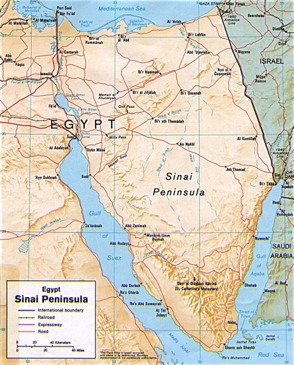
On October 25, 2016, an Egyptian police officer shot and killed an Israeli teen. Working as a contractor doing repairs on the Israeli-Egyptian border fence, the young Israeli was mistaken as a smuggler. Not an isolated instance of violence on this border, the shooting represents a greater regional tension, which impacts both Egypt and Israel.
Throughout history, Sinai served as a land buffer and an access route, connecting Asia and Africa with Eretz Yisrael in the north. With difficulty, armies, goods and people traversed its unfriendly, mountainous deserts. Today, Islamic militants, human trafficking and a variety of illegal drug operations have found relative safe havens there. Once a belligerent staging area between Israel and Egypt in the 1956 and 1967 wars, the Sinai Peninsula now poses a serious threat to both Egyptian and Israeli security.
In the past few years, fighting between Egyptian security personnel and Islamic militants has become commonplace in the Sinai, leaving hundreds dead. As ISIS expands its reach into Western Asia and North Africa, Sinai has become a strategic haven to hide and carry out nefarious operations.
Kidnapped sub-Saharan African refugees and migrants, as well as sex slaves are regularly transported through Sinai. Often held for ransom or killed en-route to Israel or the Arabian Peninsula, the human cargo remains a commercial business.
Illegal drugs, both produced in the Sinai and smuggled in from all over the region, filter into Israel and Egypt through the area’s porous borders. After the 1982 Lebanon War, drug lords moved their drug smuggling and production operations into Sinai to avoid Israeli, Syrian and Lebanese forces from interfering with their lucrative transactions.
Additionally, in the southern Sinai, a once-thriving multi-billion-dollar tourist industry along the coral-lined Red Sea coast is rapidly disappearing as a result of the security situation. In a fledgling effort to recover this major contributor to Egypt’s GDP and curtail the tailspin that is Egypt’s grasp of control over the area, Egyptian President al-Sisi is struggling to bolster security—shooting at smugglers, Islamic militants and illegal border-crossers. The unnecessary and untimely death of the Israeli teen is a symptom of the more complex regional problem that seems to have no imminent solution, yet one that finds Israel and Egypt in cooperation.
